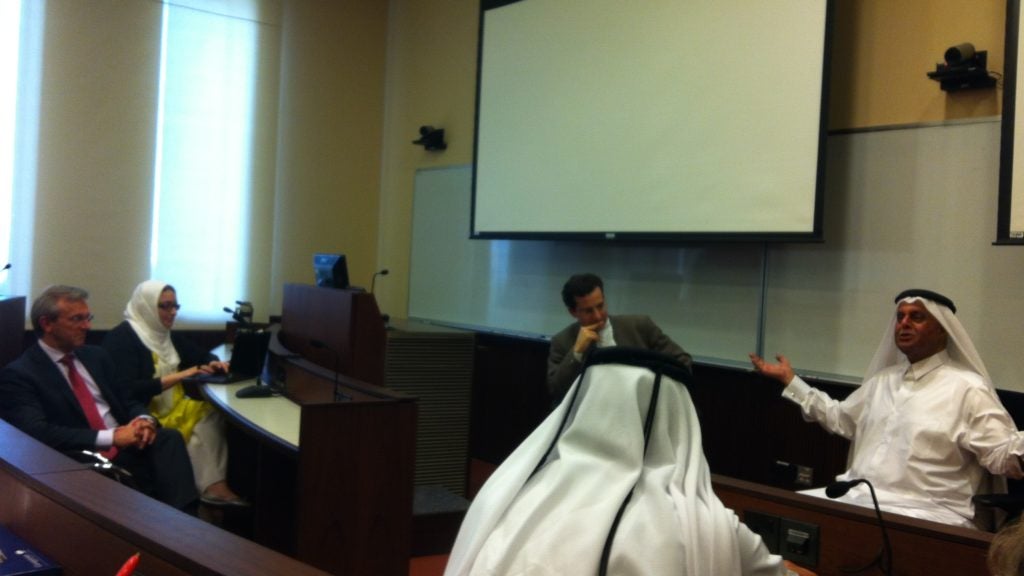Front Seat to History

The President of the Administrative Control and Transparency Authority in Qatar, H.E. Abdullah bin Hamad al Attiyah, treated a classroom of students Georgetown University’s School of Foreign Service in Qatar to a personal visit, where the Minister shared his insights in a lecture titled “The Lebanese Republic Between the Past and the Present”.
“As a longtime student of Lebanon, I had long heard from many different sources – both Lebanese and Qatari – how steeped Abdullah bin Hamad al Attiyah was in Lebanese and regional history,” said Dr. Mark Farha, professor of history at GU-Q. “In, fact, I was told nobody knew – and loved – Lebanon more than he. This is why he was invited to my seminar called “Lebanon’s History, Society and Politics”. At his lecture, it quickly became apparent that these claims were not an exaggeration.”
Passing over the podium for the casual simplicity of a chair pulled close to the 25 students in attendance, the Minister and longtime Qatari politician considered the opening question posed to him by Dr. Farha: “The strength of Lebanon, that it is a melting pot, is also its weakness. So the very notion of a diversity that makes it vibrant also makes it susceptible to weakness. Do you see a pattern? What lessons do you draw from this experience of vulnerability & strength?”
Over the course of almost 2 hours, the Minister shared his deep insights into the interwoven fabric of Middle Eastern history which is particularly apparent in Lebanon. He detailed a picture of the forces that shaped its early history, rooted in the challenges presented by its diverse ethnic and religious population. He recounted many personal experiences that demonstrated how, in a country where “political parties are a family business”, the knowledge of the tribal families and political leaders within each sect becomes an imperative aspect to understanding the complex landscape of Lebanese history.
“Here was someone who had absorbed key lessons from reams of history books with such discrimination so as to craft a well-grounded story delivered with passion and depicted without the usual partisan bias which marks much of the discourse on Lebanon,” said Dr.Farha. “This was history at its best, brought to life with the passion of a scholar and the first-hand experience of a seasoned diplomat.”
“I think it was fascinating because he’s not specialized in the academic field of Arab Studies or Lebanon as a country of study, but from so much general knowledge he basically summed up our class and added more information to it,” said Mohamad Khalil, a CULP senior and student of the course. “I think it was a great opportunity. I’m Lebanese, yet he probably knows much much more than I know. He knew about everything, from the village, to the politics, to the society, to the religion and the history going back to medieval times with Fakhr al-Din, so it was really fascinating topic. The Minister was probably one of the most informative guests we’ve ever had.”
“A common word of consensus we arrived at was ‘Dialogue is the basis of civilization’,” added Dr.Farha. “In this spirit, we hope another hiwaar will be possible to the benefit of our students who were as grateful as I for being able to listen to, and learn from this inspirational individual.”Mark Farha is an Assistant Professor of Government at Georgetown’s Edmund A. Walsh School of Foreign Service in Qatar (GU-Q). He received a PhD in History and Middle Eastern Studies from Harvard University in 2007, where he served as Head Teaching Fellow for courses on Middle East History and Politics from 2001-2007. He specializes in Lebanon, secularism and sectarianism in the Middle East.